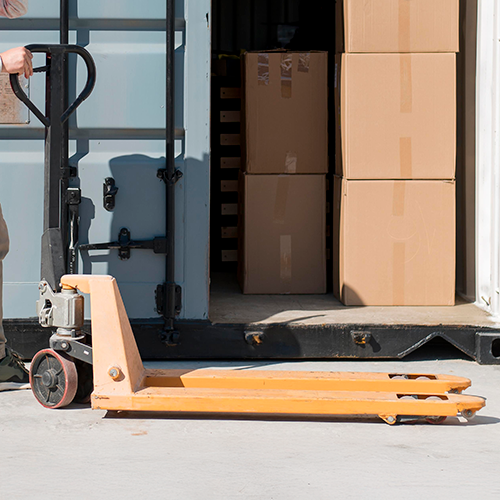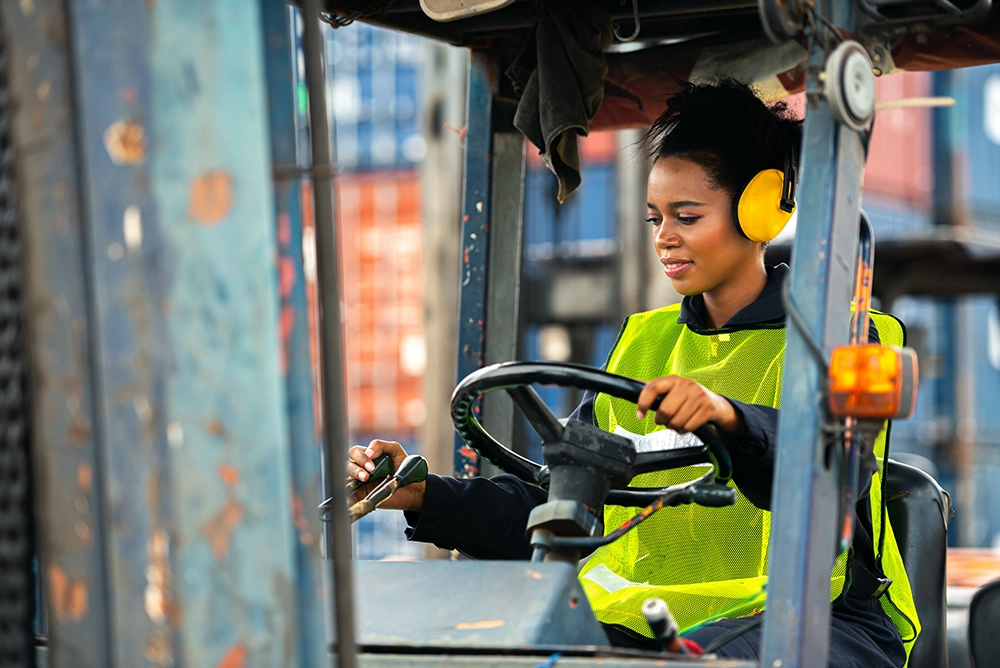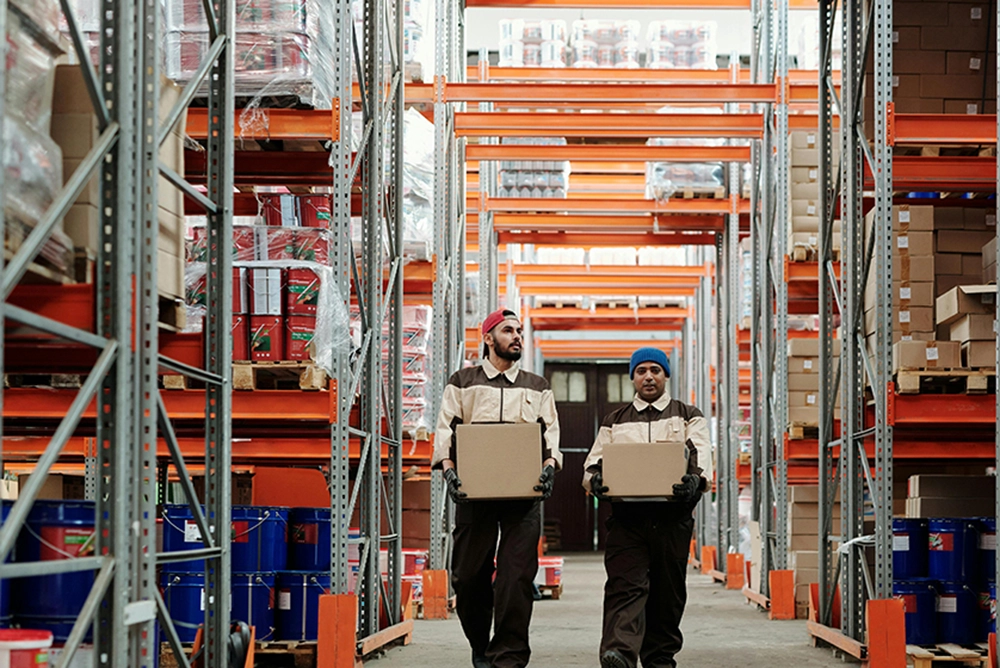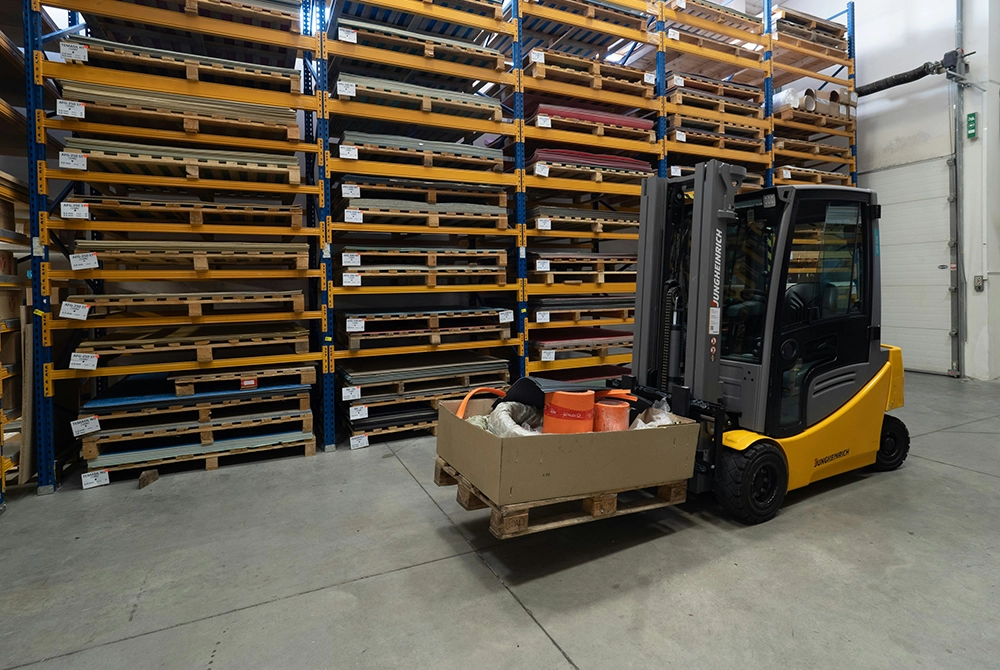Forklifts are a very common tool in warehousing, 3PLs, and logistics industries. Forklifts can be used to move pallets and larger items around the warehouse. Forklifts are also commonly used in warehouse shipping to load and unload trucks. Some forklifts are used by temporary warehouse workers and full time picker packers to pick orders around the warehouse.
Choosing the right forklift impacts efficiency, safety, and cost. Success doesn't just depend on the machine, it also depends on having the right staff to operate it.
This article gives a quick overview of the different types or forklifts and the benefits they provide.
Types of Forklifts and Their Pros & Cons
Counterbalance Forklifts

Counterbalance forklifts are the standard forklift. This forklift has forks in the front and a heavy weight in the back to balance the load being lifted. This machine is versatile, easy to use and is the most common forklift used in warehouses.
Warehouses use this forklift to load and unload trucks. And for general warehouse use like moving pallets around open spaces. Because this forklift is so common it is easier to find warehouse staff with licenses to operate these machines.
Benefits
- Easy to operate
- Versatile for many tasks
- Available in gas, electric, or diesel models
Drawbacks
- Limited maneuverability
Reach Trucks

A reach truck is a specialized type of forklift built for narrow aisle warehouse and high stacking. The operator sits in a little cockpit, sometimes sideways and sometimes forward. The mast can extend forward into racking to grab pallets and pull them out.
This forklift is best for tall racking systems and narrow isles where counterbalance forklifts can’t fit. Because this is a more specialized machine finding warehouse temp staffing who can operate this can be more difficult.
Benefits
- Extremely efficient in high density storage
- Can lift loads higher than standard forklifts
- Great for maximizing vertical space
Drawbacks
- Not designed for outdoor use or rough surfaces
- Lower weight capacity compared to other forklifts
- More specialized training required for operators.
Pallet Jacks (Manual & Electric)

Pallet jacks are the simplest and most basic tool for moving pallets around a warehouse. A pallet jack has two forks that slide under a pallet. As well as a handle that pumps up hydraulics to lift the pallet a few inches off the ground. These can come in manual powered and electric powered versions.
Nearly anyone can use a pallet jack as you don’t need a license to operate one. This makes it easy to find warehouse workers who can use pallet jacks.
Benefits
- Affordable
- Good for tight spaces
- Good for loading docks, retail stock rooms or small warehouses
- Easy to use
Drawbacks
- Can’t lift pallets high
- Manual versions require physical effort
- Not good for long distances
- Limited lifting capacity
Order Pickers

An order picker is a type of forklift design for picking individual items. Instead of whole pallets, from warehouse racks. The operator platform can raise up along with the forks. The worker can physically pick items from shelving at different heights.
Some models are low level while others are high level reaching 20+ feet. These are best for warehouses focused on piece-picking rather than full pallets. Warehouses in e-commerce or retail fulfillment.
Benefits
- Makes picking orders faster and safer
- Improves productivity in high-volume fulfillment centers
Drawbacks
- Not ideal for heavy duty lifting
- Required trained operators for safety
- Best suited for specialized warehouse setups
Rough Terrain Forklifts

Rough terrain forklifts are the heavy duty cousin of the warehouse forklift. They are built to handle outdoor, uneven, and rugged terrain where a normal forklift would struggle.
These forklifts have large pneumatic tires, similar to a tractor, for traction and stability. They are usually powered by diesel or gas and have a strong frame and higher ground clearance.
These are best used in lumber yards, construction sites, and outdoor warehouses. Places moving heavy loads across uneven ground.
Benefits
- Handles heavy loads in tough environments
- Stable and powerful
- Versatile for industries beyond warehousing (agriculture, construction, etc.)
Drawbacks
- More expensive to purchase and maintain
- Bulkier and less agile in warehouse aisles
- Fuel powered and noisier.
Choosing the right forklift is about matching your warehouse layout, storage systems, and volume of goods to the right machine.
Key Factors in Choosing the Right Forklift
- Warehouse Size & Layout: Aisle width, ceiling height, and storage type (static shelving, pallet racking, etc.).
- Load Capacity: Heavier loads require sturdier forklifts.
- Indoor vs. Outdoor Use: Electric forklifts vs. propane/diesel options.
- Budget & Maintenance : Upfront costs vs. long-term upkeep.
- Flexibility & Growth: Choose equipment that can scale as operations grow.
The People Factor
Having the right staff behind the forklift makes just as big of a difference as the forklift. No matter what forklift you use you need trained, reliable operators.
It’s important to verify that workers have safety training and certifications necessary to operate forklifts.
On-demand staffing apps and temp labor can help connect warehouses with workers who can pick up warehouse shifts. Temp agencies near you or warehouse job apps sometimes have specialized workers. They can staff warehouse shifts in roles like forklift operators.
It’s important to do your own checking though and verify that the right workers are going to the right jobs. If you hire picking and packing workers they may not be qualified to drive a forklift.
However, Bacon has solutions that can help warehouses find qualified temporary warehouse workers to handle seasonal surges without slowing down operations.
Conclusion
Choosing the right forklift requires choosing the right equipment and the right people. Warehouse managers should evaluate both sides before making decisions.
Need staff to match your forklifts? Modern warehouse job apps help you find temporary warehouse workers, with no temp agency hassle.







